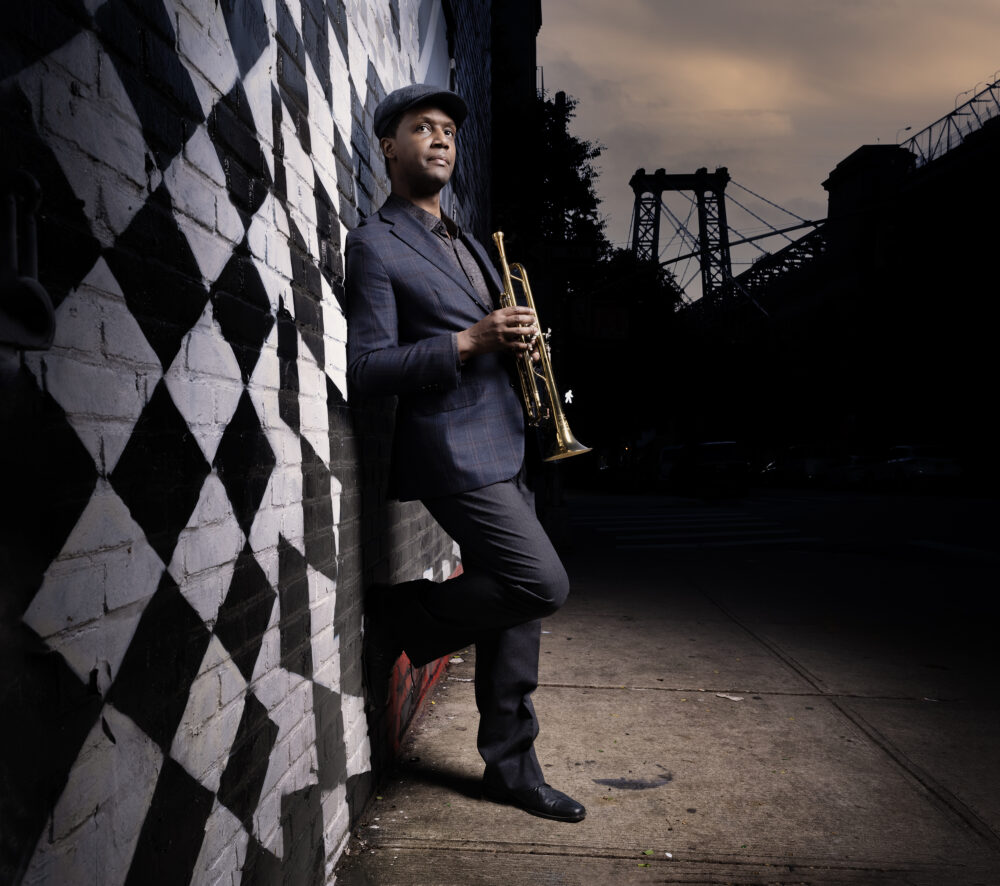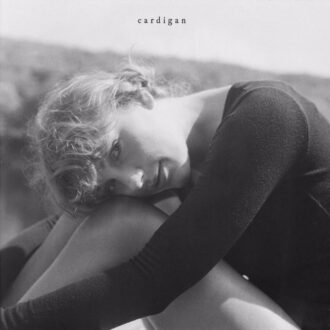Introducing Jason Palmer

Jimmy & Dena Katz
Jason Palmer is a trumpeter you should know but probably don’t. Based in New England, he’s been releasing albums as a leader since 2007. He also played with saxophonist Noah Preminger’s group for a while and was featured prominently on Matana Roberts’ Coin Coin Chapter Two: Mississippi Moonchile in 2013. But despite making consistently high-quality records and demonstrating some intriguing personality quirks — he’s apparently a big fan of female R&B singers, having recorded albums paying tribute to Minnie Riperton, Janelle Monaé and Anita Baker — the Jazz IndustryTM has never gotten behind him and given him the big push.
Fortunately, he does have two notable admirers — saxophonist Mark Turner and producer Jimmy Katz. Turner and Palmer have been working together off and on since the trumpeter’s 2011 album Here Today and steadily since 2018. And Katz, through his Giant Step Arts label/production company, has released Palmer’s last four albums: 2019’s Rhyme And Reason, 2020’s The Concert: 12 Musings For Isabella, 2022’s Live From Summit Rock In Seneca Village, and 2024’s The Cross Over: Live In Brooklyn. Turner plays on all of those, and Palmer appears on the saxophonist’s 2022 ECM album Return From The Stars and 2023’s Live At The Village Vanguard, a two-disc set also on Giant Step Arts.
Giant Step Arts is a nonprofit founded by longtime photographer Katz that offers artists they admire funding and opportunities to perform and record live, with cover artwork and CD manufacturing provided free of charge. The not-exactly-a-label has paid for recordings by drummers Johnathan Blake and Nasheet Waits, saxophonists Eric Alexander and Michael Thomas, vibraphonist Chien Chien Lu, piano trio Tarbaby, and others, but with four GSA releases to date, Palmer really seems to be Katz’s pet project.
Palmer lives in New Hampshire these days, about two hours north of Boston, where he still teaches. Prior to settling down, though, he and his family spent two years living in an RV. “I was flying from wherever the RV was to get to Boston to teach three days a week and then flying back to wherever the RV was,” he says with a weary laugh. “And then all that flying got pretty tiresome for me. So I said, you know, let’s find a place where I could just drive to work instead of fly. So we came up to New Hampshire and found some space.”
This willingness to just vanish — his RV journey took him from Washington state to Arizona to the Carolinas and Tennessee; he even knows the part of Montana where I live — may help explain why, in Turner’s words, “Other musicians have always known about [Jason], but he’s not on the radar of the promoter class.” Another example of his indifference to traditional careerism is his long, long tenure leading a house band of sorts at Wally’s, a small Boston bar open since 1947. (Palmer compares it to New York’s legendary 55 Bar, which closed in 2022.) He played at Wally’s weekly for over 20 years, in the process developing a stylistic quirk that manifests on Live At Summit Rock and The Cross Over. Many of the pieces on those albums begin with Palmer playing a sometimes minutes-long unaccompanied intro, before the rest of the band comes in.
“At Wally’s it was a thing where not everybody came to listen to the music,” he explains. “Sometimes people just come to drink or whatnot, and so it’s kind of announcing that the band is here, you know, the trumpet is here.”
It was at Wally’s that Palmer and Turner first met. The trumpeter had already been an admirer of the saxophonist for years: “I went to New England Conservatory [in Boston] and I spent a lot of time transcribing him. So his voice, his compositional voice, his tone, the way he breathes, you know, his phrasing, that’s been inside of my head and inside of my creative bowl of whatever I use to create my own work for a long time.” In fact, when Turner walked into the bar, Palmer and his band were playing “Jacky’s Place,” from the saxophonist’s album Dharma Days. After the performance, Palmer introduced himself, and their creative partnership began.
Interestingly, when I asked Turner how he thought their voices meshed, he didn’t talk about music at all. Instead, he observed that “Jason has a lot of fight in him, and I see that as something we share.” He added, “I’m not talented at all; I’ve had to work for everything I’ve done and practice a lot.” Mark Turner’s always had a reputation as one of the most self-effacing jazz musicians around, but every time I hear him say something like this, it boggles my mind.
When I asked Palmer the same question, and told him what Turner had said, he agreed and said that he, too, has achieved everything he has not through innate talent but relentless practice and hard work. “I’m probably the least gifted player of all time… I’ve always had to rely on just sitting in a practice room and really learning this music. I don’t think things really came easily for me, and I mean, the trumpet is a very unforgiving instrument.”
Palmer is a traditionalist where the trumpet is concerned. He treats it as an instrument with a specific lineage and language, which he strives to extend. “I’ve always tried to be the kind of player that’s transcribable,” he says, citing “clean” players like Booker Little, Freddie Hubbard, Clifford Brown, Fats Navarro, and Kenny Dorham as inspirations. He writes and plays music “where you could listen to it and really know what it is, and you could maybe learn it by ear and play it back without having to really turn over the way that you approach the instrument.” At times, his precision and technical command of the horn remind me of Woody Shaw or even Wynton Marsalis’s classical recordings (as opposed to his jazz playing).
This pairs very well with Turner’s approach to the saxophone, which feels simultaneously intellectual and emotional. Turner is a Buddhist, and while his solos are highly expressive, they’re never showily passionate. When he’s playing beside Palmer, they treat the unison melodies as recitations, and the solos they offer have the air of a conversation between two people who fundamentally agree. Neither ever attempts to overpower the other or “win”; they just state their piece, then step back to hear what the other has to say.
The dynamic between Palmer and Turner remains essentially the same, no matter which man is the leader on a given session. They recorded Turner’s ECM album Return From The Stars with bassist Joe Martin and drummer Jonathan Pinson in 2019, but it wasn’t released until three years later, at which point the quartet reconvened at the Village Vanguard. Live At The Village Vanguard, a two-CD set, was released on Giant Step Arts in September 2023. “I sound and feel totally different on those two records,” Palmer says, and it’s true. They play all eight tracks from Return… on the live set, and they’re completely transformed — looser, more swinging, and often longer. But that conversation-between-peers feel is unmistakable, despite the nearly 15-year difference in their ages (Turner is 59, Palmer 45).
That quartet has recorded a second album for ECM, which will be out later this year. Palmer says, “This was one of those instances where we went into the studio after we had toured the music for two weeks, and so the music really came together… Manfred Eicher was there, so it was a really nice hang and he had some really cool input to give on it. There’s a few tunes on there that were really fresh that that we had only played on that tour.”
The Cross Over was recorded in August 2023 at Ornithology, a small club in Brooklyn run by Mitch Borden, one of the co-founders of the venerable Manhattan spot Smalls. Palmer and Turner are backed by bassist Larry Grenadier and drummer Marcus Gilmore, who had been playing together in saxophonist Joshua Redman’s band. At the beginning of the year, the trumpeter sent everyone a set of nine compositions he’d been workshopping, but they were only able to get one day of rehearsal before the performances. Still, that was enough.
“We actually did get to run the music down, so it felt really comfortable to play, and so then when we went in and recorded those two days at Ornithology, the first day didn’t feel like a rehearsal,” he says. “I tried to write tunes that weren’t so hard that they would have to stay glued to the piece for the entire time. I tried to find that balance of, you know, writing stuff that’s just interesting enough for them to want to invest some time to really play it, but then be able to feel free enough to really express themselves once it came time for them to improvise over the songs.”
The pieces on The Cross Over are quite long. Like I said, there are nine compositions, but the set spans two CDs and lasts two and a quarter hours. The shortest performance, “Do You Know Who YOU Are? (A Line For C. West),” runs 11:23; the longest, “Beware Of Captain America (A Line For Wayne Shorter),” lasts over 21 minutes. “You know, it’s one of those things where you might have to take it in doses — you know, listen to one song a day or something like that,” Palmer says with a laugh. But this, too, is part of his attempt to extend the post-bop tradition; in its florid virtuosity and willingness to make every piece a Statement, The Cross Over reminds me of Woody Shaw’s Stepping Stones, recorded live at the Village Vanguard in 1978.
“I think the first tune [‘B.A.M.D. (Budgets Are Moral Documents)’], I played the trumpet for seven, eight minutes, you know, horn to mouth; that’s really not that common amongst playing the trumpet and playing this kind of music,” he says. “One part of it is that you know, I’m physically able to do it now and the older I get, this kind of thing won’t be possible, so you may as well… I felt like I needed to push myself to see how long I could play beautifully, you know, and still keep it together and still feel like I had something to say over a tune.”
In other words, now is a perfect time to start listening to Jason Palmer.
TAKE 10
PainKiller - "Samsara III"
I still remember when I first heard PainKiller — an improvised collaboration between saxophonist John Zorn, bassist Bill Laswell, and Napalm Death drummer Mick Harris. Their debut EP, Guts Of A Virgin, was 24 minutes of unholy sax shrieks, noise-dub bass, and thundering blast beats. They existed as a unit until 1995 or so, then went their separate ways, but now, 30 years later, they’re back. Harris is no longer playing drums; he makes electronic music now. This new album — the first of three, I am reliably informed — is therefore built around his skull-rattling beats and ominous hisses and rumbles. He sent Zorn rhythm tracks, which the saxophonist improvised over; Laswell filled in the gaps with ambient dub bass. The result, eight tracks in 40 minutes, is less anarchic and aggressive than PainKiller’s earliest work but also hypnotic and at times weirdly soothing. I can’t wait to hear what they do next. (From Samsara, out now via Tzadik.)
Unionen - "Ståhlbad"
Unionen is an all-star quartet that takes its name from the period from 1814 to 1905, when Sweden and Norway had a common monarch; it consists of reeds player Per “Texas” Johansson, keyboardist Ståle Størlokken, bassist Petter Eldh, and drummer Gard Nilssen. On one track from this album, they’re joined by vibraphonist Mattias Ståhl. All four of these men routinely stretch the boundaries of jazz and even music itself, so there’s as much electronic sound and compositional weirdness as there are swinging beats and passionate sax solos. “Ståhlbad” (“Steel Bath”) begins with a gentle, electronically warped reed melody, echoed by almost ambient Radiohead-ish keyboards and a ticking cymbal beat. Eventually the electronics become weirder and more disruptive, like Autechre at their prettiest, and Nilssen’s drumming breaks down as though he’s struggling to find his way through fog. This is uncategorizable music made by players with wide-open ears and plenty of ideas. (From Unionen, out now via We Jazz.)
Iro Haarla Ouranos Ensemble - "Deliverance" (Feat. Aija Puurtinen)
Finnish pianist Iro Haarla has made albums for ECM, Svart, and TUM; her music has a stately beauty that brings to mind the frigid landscapes of her home country, but also invites you in like a cabin with a roaring fire. This latest release is on her own Willa Silva label and features her husband, Ulf Krokfors, on bass, alongside saxophonist and flutist Jone Takamäki, vocalist Aija Puurtinen, and drummer Aniida Vesala (her daughter with her first husband, legendary Finnish drummer/composer Edward Vesala). Keeping the music in the family in this way gives it a palpable intimacy; everyone’s on the same page, even when they seem to be at cross purposes. On “Deliverance,” Puurtinen’s lyrics emerge like prayers, vanishing into echo as Vesala’s drums and cymbals build drama behind her, eventually summoning Takamäki, whose saxophone emits cries of animalistic distress as Haarla and Krokfors turn it all into moody beauty. (From Under The Firmament, out now via Willa Silva.)
Andrew Hill - "Divine Revelation"
Pianist Andrew Hill was best known for his small group work; he made a string of albums for Blue Note in the ’60s that provided a bridge between hard bop and the avant-garde. But when he got the chance to lead larger ensembles, his vision expanded to fill the space. This is a remastered and expanded version of a 2002 album featuring what was then billed as the Andrew Hill Sextet Plus 10, recorded live at Birdland in NYC. The new version features about 20 extra minutes of music and a clearer mix that really brings out the creativity and richness of the horn arrangements (all put together by trumpeter Ron Horton; Hill’s “compositions” were collections of fragments, with enigmatic instructions about how they were to be combined). The opening “Divine Revelation” features a fierce tenor sax battle between Greg Tardy and Aaron Stewart and tuba growls from Jose Davila. (From A Beautiful Day, Revisited, out now via Palmetto.)
George Cables - "Journey To Agartha"
Pianist George Cables recently turned 80, and he’s had some health issues the past few years, but you’d never be able to tell from the performances on this trio disc featuring bassist Essiet Essiet and drummer Jerome Jennings. Cables whips up a blend of original compositions and well-known tunes from Duke Ellington, Horace Silver and others, and delivers them all in the hard-swinging, melodically sophisticated style he’s displayed for decades on albums by Dexter Gordon, Woody Shaw, the all-star band the Cookers, and many more. He also proves that he’s got one ear to the ground, even at his age, as the last full-band piece on the record is “Journey To Agartha” by young New York-based pianist Arcoiris Sandoval. (You can hear the original version, from her 2018 album First Voyage, on Bandcamp.) It’s an energetic, uptempo piece that the whole band treats like an opportunity to get up and dance. (From I Hear Echoes, out now via HighNote.)
Ronald Snijders - "Maseko"
Surinamese/Dutch multi-instrumentalist Ronald Snijders made his debut in the late ’70s with the self-released Natural Sources, an album on which he played every instrument and combined Caribbean music, jazz, and funk into a swirling global fusion style all his own, with his flute front and center. This album, recorded direct to disc in February 2024, accompanies a reissue campaign that will see Snijders’ first four solo albums remastered for the first time. “Maseko” is an uptempo calypso-esque tune driven by parade-style drums from Yoran Vroom, with gentle Bob James-esque electric piano from Mike Del Ferro floating above a pulsing, popping electric bass line from Jeroen Vierdag. Saxophonist Efraim Trujillo shadows Snijders on the melody before taking a brief solo that’s more about keeping the energy level high than demonstrating instrumental virtuosity, though he manages that, too. This is funky party jazz, with a few meditative interludes sprinkled in for breath-catching purposes. (From Penta, out now via Night Dreamer.)
Nicola Miller - "Seagulls"
Canadian alto saxophonist Nicola Miller waited nearly 20 years after getting her degree in jazz performance before recording her debut album. The additional study and life experience she gained in between helped her create music that makes Living Things one of the most fascinating records I’ve heard in quite a while. The ensemble includes Frank Gratkowski on alto sax and bass clarinet; Doug Tielli on trombone and saw; Nicholas D’Amato on bass; and Nick Fraser on drums. The music was inspired by field recordings and graphic scores, and includes guided improvisation and unconventional instrumental techniques alongside more traditionally written material. “Seagulls” was based on a transcription of slowed-down recordings of those birds’ hoarse cries, and begins slowly, with the horns hissing, popping and moaning, before the bass and percussion that sounds like a junk sculpture come in. This is unearthly, fascinating music, influenced by nature but recalling Tom Waits. (From Living Things, out now via Cacophonous Revival.)
Out Of/Into - "Ofafrii"
Out Of/Into started life as the Blue Note Quintet, a band put together for a tour celebrating the label’s 85th anniversary. Led by pianist Gerald Clayton, the group also includes alto saxophonist Immanuel Wilkins, vibraphonist Joel Ross, bassist Matt Brewer, and drummer Kendrick Scott. Motion I is their debut album, featuring four compositions by Clayton and one each from Ross, Brewer, and Scott. “Ofafrii” is the album opener, written by the pianist and featuring an extended solo from Ross, playing marimba. Wilkins steps into the spotlight after him, taking a typically crying, bluesy solo that displays passionate intensity but always stays grounded in the melody and the groove. Brewer and Scott are a busy, but focused rhythm team, keeping the furnace stoked at all times and sending the engine speeding down the track with no danger of derailment. Clayton is the final soloist, making a brief statement before it all resolves. (From Motion I, out now via Blue Note.)
Sun & Rain - "Waterfall II"
Little Women were an amazing, fascinating group. A quartet featuring Travis Laplante on tenor sax, Darius Jones on alto sax, Andrew Smiley on guitar, and Jason Nazary on drums, they made music that combined No Wave skronk with high-pitched, repetitive horn interplay reminiscent of minimalist composition, then added their own breath to draw you even deeper into the raw physicality of music-making. Their two full-length albums, Lung and Throat, are essential 21st century music. Now, three LW members (Laplante, Smiley, and Nazary) have reunited in Sun & Rain, joined by alto saxophonist Nathaniel Morgan. The music on Waterfall was composed collectively over a period of six years, only when all four members could be physically present to work on it together. You can hear it, too; the interlocking melodies and patient rhythms have the interactive, communitarian feel of folk music. I love this, and I hope they keep at it. (From Waterfall, out now via Out Of Our Heads.)
Isaiah Collier, William Hooker, & William Parker- "2023-05-12 LA Set II"
When I first heard about the trio documented on The Ancients, I was thrilled. Saxophonist Isaiah Collier has been making a lot of waves in the last few years, primarily as the leader of his group the Chosen Few (who made four albums, including two released in 2024, before disbanding), but also in the duo I AM with percussionist Michael Shekwoaga and on a direct-to-disc session released under his own name. His music is socially engaged spiritual jazz, a point on a line that runs from John Coltrane and Pharoah Sanders to Gary Bartz to Charles Gayle to Kamasi Washington…and particularly through Roscoe Mitchell and Ari Brown and Fred Anderson, because Collier is emphatically a Chicago musician.
What’s compelling about his approach is that he’s a synthesist who takes bebop, R&B, soul, gospel and free jazz and combines them all in ways that showcase the best aspects of each. His playing is emotional, but grounded, and structured in a way that allows you to follow his musical statements from beginning to end. In an interview in the fourth volume of trumpeter Jeremy Pelt’s Griot book series, Collier says, “You can’t know freedom if you don’t know restriction. There’s a balance to all this stuff. Even playing free isn’t playing free. I learned that playing with Denardo Coleman. I learned that playing with William Parker. I learned that playing with Ernest Dawkins. I learned that studying with Roscoe Mitchell. There are prerequisites to this stuff.”
And as that statement proves, Collier is someone who knows what he doesn’t know and seeks out opportunities to gain that knowledge, by playing with musicians generations older than himself, as he does here. Drummer William Hooker has been performing for almost 50 years, self-releasing his debut album, …Is Eternal Life, in 1977. His music spans free jazz, noise rock (he’s recorded duo albums with both Sonic Youth guitarists, Thurston Moore and Lee Ranaldo) and indescribable zones of pure sonic exploration. Bassist William Parker is, of course, William goddamn Parker, a legend of avant-jazz who’s played with everyone you’ve ever heard of and led a thousand brilliant bands.
This double live LP features recordings from three nights of shows — May 12 and 13, 2023 at 2220 Arts & Archives in Los Angeles and May 15 at The Chapel in San Francisco. It’s a breathtaking 90 minutes of three-way interaction, two ascended masters supporting a new but very promising disciple. Collier borrows from the AACM, from Pharoah Sanders, from Charles Gayle, and from bebop (I swear he quotes “Salt Peanuts”), while Parker makes his bass sound like a guembri, a donso ngoni, a guitar, and someone beating their palms against the inside of a wooden ship’s hold, and Hooker’s drumming is heavy foot and precise snare, plus some of the most amazing cymbal washes you’ll ever hear. This is “free jazz” as ancestral lore being passed down live in the moment. Forty years from now, Isaiah Collier will be teaching it to musicians in their twenties who heard these recordings and sought him out. (From The Ancients, out 1/31 via Eremite.)



